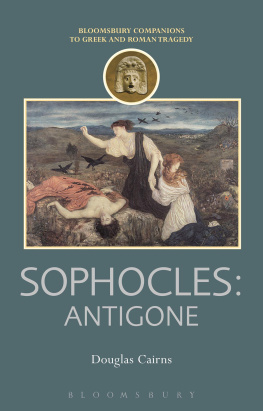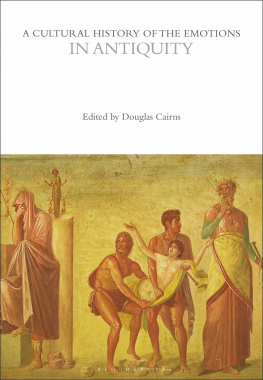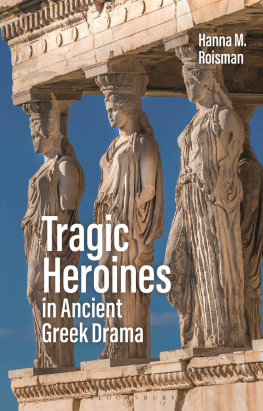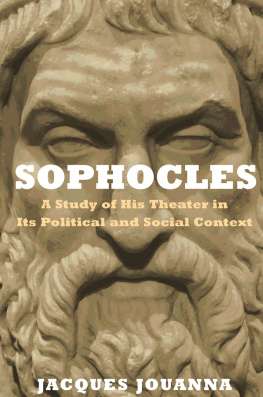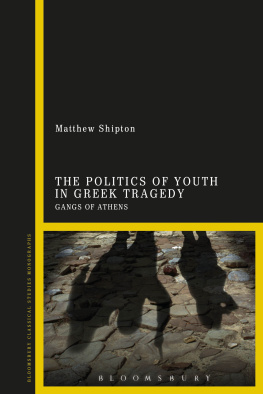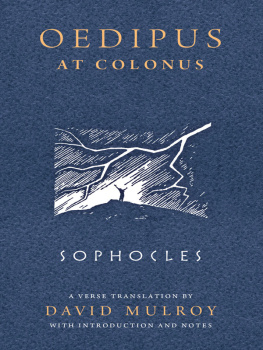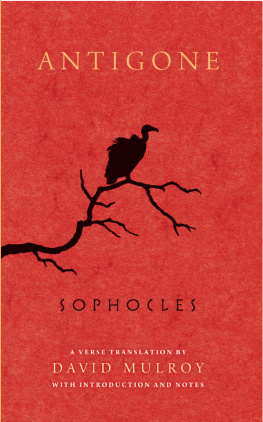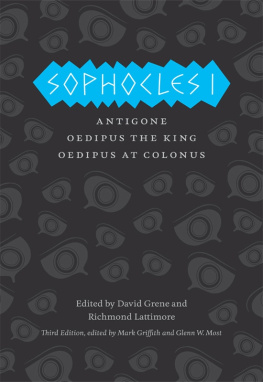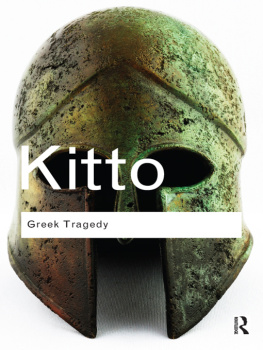Sophocles: Antigone
COMPANIONS TO GREEK AND ROMAN TRAGEDY
Series Editor: Thomas Harrison
Aeschylus: Agamemnon, Barbara Goward
Aeschylus: Eumenides, Robin Mitchell-Boyask
Aeschylus: Persians, David Rosenbloom
Aeschylus: Prometheus Bound, I. A. Ruffell
Aeschylus: Seven Against Thebes, Isabelle Torrance
Aeschylus: Suppliants, Thalia Papadopoulou
Euripides: Alcestis, Niall W. Slater
Euripides: Bacchae, Sophie Mills
Euripides: Hecuba, Helene P. Foley
Euripides: Heracles, Emma Griffiths
Euripides: Hippolytus, Sophie Mills
Euripides: Ion, Laura Swift
Euripides: Iphigenia at Aulis, Pantelis Michelakis
Euripides: Medea, William Allan
Euripides: Orestes, Matthew Wright
Euripides: Phoenician Women, Thalia Papadopoulou
Euripides: Suppliant Women, Ian Storey
Euripides: Trojan Women, Barbara Goff
Seneca: Phaedra, Roland Mayer
Seneca: Thyestes, Peter Davis
Sophocles: Ajax, Jon Hesk
Sophocles: Electra, Michael Lloyd
Sophocles: Oedipus at Colonus, Adrian Kelly
Sophocles: Philoctetes, Hanna Roisman
Sophocles: Women of Trachis, Brad Levett

Contents
This book has been a long time in the making, but my work on it really got going while I was teaching at Florida State University in 2012. The students in my graduate class on Antigone at FSU stimulated and challenged my interpretations, but also demonstrated their own acumen as scholars in their splendid research presentations on some of the landmarks in the plays reception history. For the impetus that their work gave to my own I thank Ana Belinskaya, Sophie Crawford-Brown, Daniel Culbert, Ann Glennie, Buddy Hedrick, Stephen Kiepke, Travis King (my stalwart research assistant), Cliff Parkinson, Tommy Redmon, Allison Smith, and Evan Waters. Classics at FSU was a great environment to work in, thanks to the hospitality and helpfulness of my hosts, especially Patrick Byrne, Francis and Sandra Cairns, Laurel Fulkerson, Trevor Luke, John Marincola, Daniel Pullen, Allen Romano, Svetla and Don Slaveva-Griffin, and Tim Stover. Lunches with Kenneth Reckford, in which we discussed Antigone and a great deal more, were a joy.
For generously sharing their knowledge and their work I thank Bill Allan, Efi Athanasopoulou, Felix Budelmann, Alison Burke, John Cairns, Mirko Canevaro, Willy Cingano, Federico Condello, Elizabeth Craik, Cecilia Criado, Pat Easterling, Patrick Finglass, Bob Fowler, Mark Heerink, Alessandro Iannucci, Paddy Lyons, Agis Marinis, Andrea Rodighiero, Yoshinori Sano, and Olga Taxidou. Bill Dominik kindly shared not only an elusive copy of Osofisans Tegonni but also a film of the play in performance. An invitation from Seth Schein to a marvellous Sophoclean colloquium at UC Davis gave me the chance to see a fine staging of The Island. In the summer of 2013 I had the opportunity to present several papers on Antigone in Japan and to make use of the library of the Classics department at the University of Bologna. Makoto Anzai, Martin Ciesko, Kiichiro Itsumi, Tetsuo Nakatsukasa, and Yoshinori Sano were excellent hosts and interlocutors in Tokyo and Kyoto; Alessandro Iannucci arranged the Bologna visit, and Francesco Citti and his colleagues made me most welcome. Antnio Caeiro invited me to speak at a very stimulating, philosophically oriented workshop on Antigone in Lisbon in July 2015, just as I was completing this volume. Visits to the Fondation Hardt, Vandoeuvres, made it easy to write in peace, but also in very convivial company. The staff of the Joint Library of the Hellenic and Roman Societies in London have been unfailingly helpful.
In preparing a book that I hope may be of interest to a wide audience I was often reminded of those to whom I owe my own love of Greek literature. I first encountered Sophocles at school in Shettleston, where I read Ajax in Greek with Alan Jones, after being introduced to the language by Alex Livingstone and Allan Murray. I wouldnt have written this book without them or without Alex Garvie or Douglas MacDowell, first inspiring lecturers, then my PhD supervisors at Glasgow University. I dont think I ever write a word that does not somehow reflect their influence.
Equally, working on one of the most influential works of Greek culture has brought back many conversations with friends who have shared and stimulated my interests over the years. Some are thanked above for help with this specific project. It might be invidious to single out others. But Ive never forgotten the sincerity and passion that Robin Hankey, Doug Little, and Agathe Thornton brought to our many discussions of Greek literature and thought in Dunedin between 1988 and 1992.
One does not need to read Sophocles to know that the Greeks were right about the mutability of fortune (and, lets face it, about at and hamartia too). In the period before I finished this book I was lucky to be able to count on Steve Archibald, Donald Bloxham, David Carruthers, David Cartwright, Martin Chick, Frank Cogliano, Yvonne McEwen, Jim Pope, and Jill Stephenson, and on my family, Betty and Jim Aitken, Alan Best, and Owen Cairns.
Finally, I need to thank the publishers: they were Duckworth when I started, but are now Bloomsbury. I know Ive tried the patience of three commissioning editors, and of the series editor, Tom Harrison, since I first promised to deliver this short book; I thank them very much for waiting.
DLC
Edinburgh, October 2015
| Ant. | Sophocles, Antigone |
| FGrHist | F. Jacoby (ed.), Die Fragmente der griechischen Historiker (Leiden: Brill, 192358). |
| Fowler | R. L. Fowler (2000) in bibliography. |
| LIMC | H. C. Ackermann and J. R. Gisler (eds), Lexicon Iconographicum Mythologiae Classicae (Zurich: Artemis, 19812009). |
| K-A | R. Kassel and C. A. Austin (eds), Poetae Comici Graeci (Berlin: De Gruyter, 1983). |
| Maehler | H. G. T. Maehler (ed.), Pindari Carmina cum Fragmentis ii (Leipzig: Teubner, 1989). |
| M-W | R. Merkelbach and M. L. West (eds), Fragmenta Hesiodea (Oxford: Oxford University Press, 1967). |
| PMG | D. L. Page (ed.), Poetae Melici Graeci (Oxford: Oxford University Press, 1974). |
| PMGF | M. Davies (ed.), Poetarum Melicorum Graecorum Fragmenta i (Oxford: Oxford University Press, 1991). |
| Poltera | O. Poltera (ed.), Simonides Lyricus, Testimonia und Fragmente (Basel: Schwabe, 2008). |
| Radt | S. L. Radt (ed.), Tragicorum Graecorum Fragmenta iii (Aeschylus), iv (Sophocles) (Gttingen: Vandenhoeck and Ruprecht, 1985, 1977). |
| West | M. L. West (ed.), Iambi et Elegi Graeci ante Alexandrum Cantati (second edition, Oxford: Oxford University Press, 198992). |
The myth and its background
Many Greek tragedies treat mythological subjects that had been dealt with at least once, and often several times before, in earlier Greek literature. It is often the case that, even where earlier versions do not survive in their entirety, we can reconstruct with some confidence the relationship that exists between surviving tragedies and previous versions of the myths that they dramatize. This is a more difficult task with Sophocles

